Ai Powered Advertising: Transform Your Marketing Strategies

The Evolution of AI-Powered Advertising

Digital advertising has evolved significantly from its humble beginnings as simple banner ads. The integration of artificial intelligence (AI) is changing how marketers interact with their audiences and manage campaigns. This shift from static digital billboards to intelligent, personalized experiences represents a major leap in advertising effectiveness.
The driving force behind this evolution is the need to understand complex consumer signals, automate campaign decisions, and deliver truly personalized experiences at scale. This means leaving behind static campaigns and embracing dynamic, responsive strategies.
From Static to Smart: How AI Changed the Game
Early applications of AI in advertising focused on simple tasks like keyword bidding and basic targeting. However, progress in machine learning and data processing has unlocked exciting new possibilities.
For instance, AI now drives complex algorithms that analyze vast datasets to predict consumer behavior. This allows for more precise targeting and personalized messaging, resulting in higher engagement and conversion rates. AI also automates time-consuming tasks such as A/B testing and bid optimization, freeing up marketers to concentrate on strategic planning.
The Rise of Personalized Experiences and Automated Campaigns
The growth of AI-powered advertising is undeniable. The generative AI in advertising market, valued at approximately $2.72 billion in 2024, is projected to reach $3.39 billion in 2025. This represents a remarkable 24.6% compound annual growth rate (CAGR).
This impressive growth stems from the increasing importance of personalized and targeted advertising enabled by AI. The rise of social media platforms, content marketing, and programmatic advertising also contributes to this expansion. More detailed statistics can be found here: Generative AI in Advertising Global Market Report
This rapid expansion reflects the demand for more efficient and effective advertising solutions. AI’s ability to personalize ad experiences and automate campaign management makes it an essential tool for marketers. This data-driven approach presents opportunities for businesses to connect with consumers on a deeper level. Learn more about AI-powered advertising: AI-Powered Advertising on AD360
The Future of AI in Advertising: Continuous Optimization and Authentic Connections
The evolution of AI in advertising is a continuous journey. As AI technology progresses, we can anticipate even more sophisticated applications. These include improved personalization, more efficient campaign management, and innovative creative possibilities.
However, the core focus should remain on using AI to build genuine connections with consumers. This means providing valuable experiences and respecting user privacy. The future of AI-powered advertising lies in balancing data-driven optimization with authentic brand engagement.
Personalization That Actually Connects
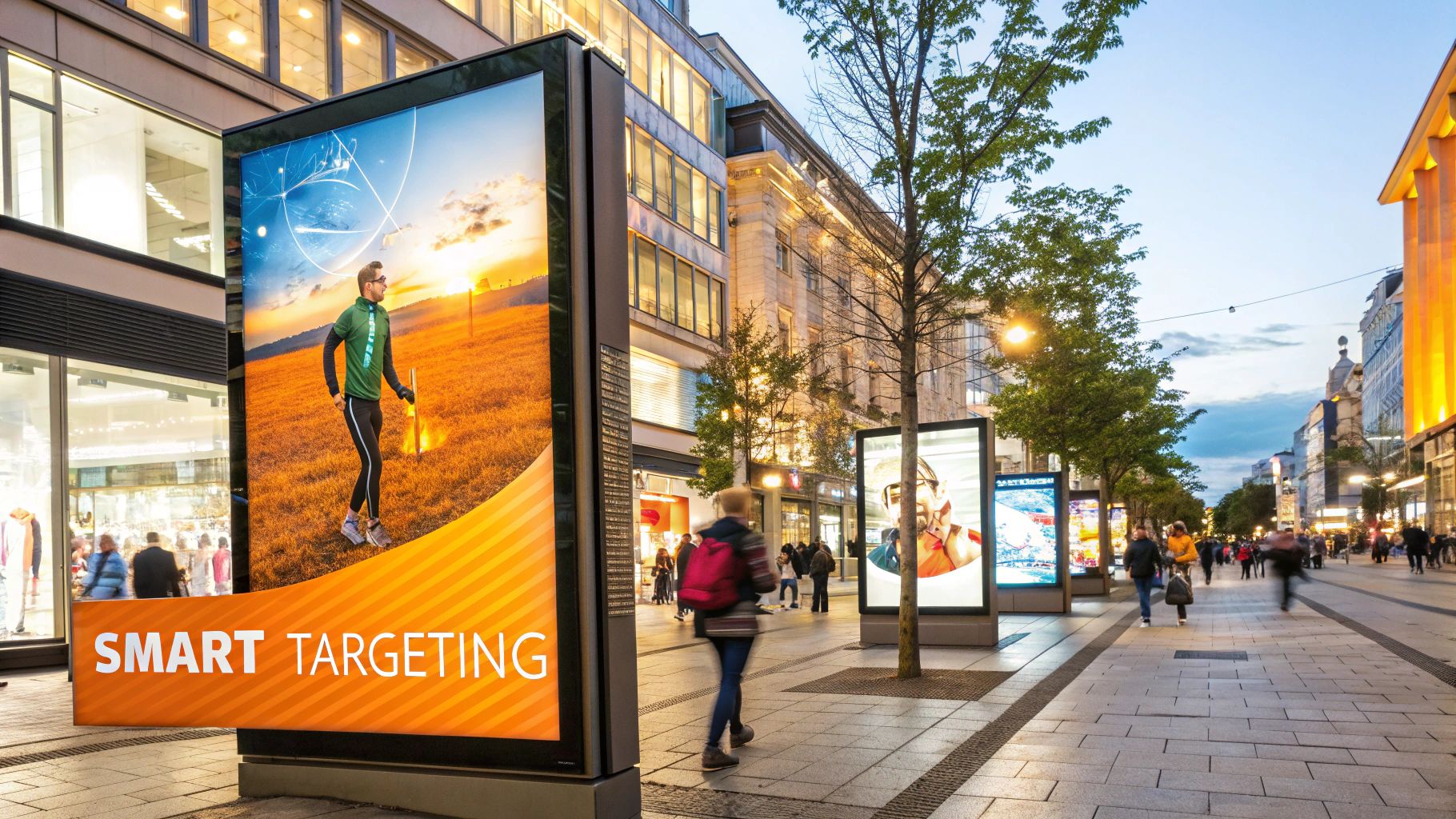
Consumers today want marketing messages that truly speak to them. They’re more likely to engage with ads relevant to their individual needs and preferences. This is the foundation of personalized advertising. And AI-powered advertising elevates this concept, moving beyond basic demographics to create truly custom experiences.
This allows marketers to deliver the perfect message, to the right person, at the optimal time.
Understanding Consumer Behavior
AI has a unique ability to identify subtle patterns in consumer behavior, often unseen by human marketers. Think of it like this: AI algorithms analyze browsing history, purchase patterns, and even social media activity to craft detailed user profiles.
These profiles then help shape highly targeted advertising campaigns delivering relevant content and special offers. This level of detail significantly increases the chances of grabbing attention and boosting sales.
Balancing Personalization With Privacy
Personalization is powerful, but protecting user privacy is equally critical. Consumers are more aware of how their data is used and expect brands to be transparent and ethical. That’s why successful AI-powered advertising prioritizes giving users real value while respecting their privacy.
This means being open about how data is collected and offering users control over their information. The use of AI in marketing is growing quickly. By 2025, it’s estimated that 88% of marketers will incorporate AI tools into their daily work. This statistic highlights how AI-driven advertising has become essential to modern marketing strategies. You can find additional data here: AI Marketing Statistics.
The Difference Between Surface-Level and Deep Personalization
Many marketers confuse basic demographic targeting with true personalization. Simply using someone’s first name or mentioning their location doesn’t cut it. Real personalization requires a deeper understanding of a person’s needs and motivations.
AI unlocks this deeper understanding. It analyzes a vast amount of data to create a more complete picture of each consumer.
Context Is Key: AI’s Role in Understanding Consumer Intent
AI algorithms decipher the “why” behind a customer’s actions. This allows marketers to anticipate needs and deliver highly relevant ads. This could involve studying search queries, website visits, or even the time of day a user is online.
AI can then deliver ads that are not just personalized, but also helpful and well-timed. Rather than being intrusive, these ads enhance the user experience, fostering positive brand perception and building strong relationships.
To understand the impact of AI, let’s look at a comparison:
The following table showcases the improvements seen with AI-driven personalization.
Personalization Results Across Marketing Channels
| Marketing Channel | Traditional Approach Results | AI-Powered Approach Results | Improvement Percentage |
|---|---|---|---|
| Email Marketing | 10% Open Rate, 2% Click-Through Rate | 18% Open Rate, 5% Click-Through Rate | 80% Open Rate, 150% CTR |
| Social Media Ads | 0.8% Click-Through Rate, 0.5% Conversion Rate | 1.5% Click-Through Rate, 1.2% Conversion Rate | 87.5% CTR, 140% Conversion Rate |
| Display Advertising | 0.4% Click-Through Rate | 0.7% Click-Through Rate | 75% |
As the table shows, AI-powered personalization drives substantial improvements across different channels. This data underscores the power of AI in boosting engagement and conversions by offering tailored experiences.
Campaign Optimization That Eliminates Guesswork
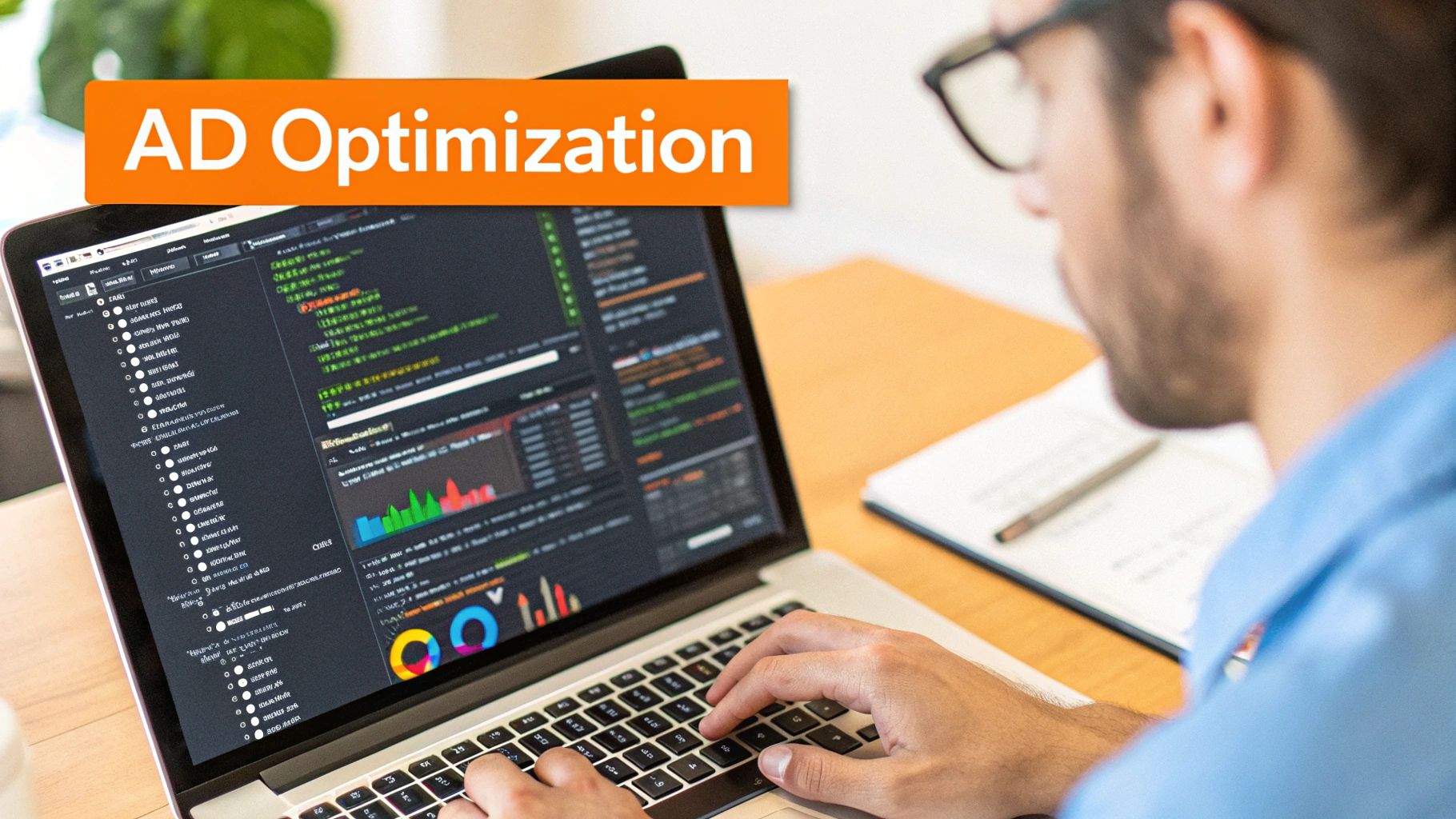
Many marketers still base campaign planning and budget allocation on gut feelings and past performance. This can mean missed opportunities and wasted ad spend. But AI-powered advertising changes the game. It brings data-driven decisions to the table, maximizing campaign impact and getting the most out of every dollar. This empowers marketing teams to optimize performance and achieve better results.
How Machine Learning Algorithms Optimize Campaigns in Real Time
AI-powered advertising platforms rely on machine learning algorithms to constantly analyze campaign data. These algorithms find patterns and trends that humans might overlook. The result? Smarter budget allocation and more effective ad placement. Campaigns are optimized in real time, adapting to shifts in market conditions and consumer behavior.
For example, if an ad creative isn’t performing well, the AI can automatically adjust bids or even pause the ad. Machine learning can also predict which users are most likely to convert, helping marketers zero in on the best leads. This kind of real-time optimization just isn’t possible with traditional manual campaign management.
Practical Applications of AI-Powered Campaign Optimization
AI is already improving campaign performance in several key areas. Programmatic buying automates the process of purchasing ad space, ensuring ads appear on the most relevant websites and apps. This streamlines budget allocation and removes the need for manual negotiations.
Dynamic budget allocation automatically shifts budgets across different channels and campaigns to maximize ROI. If a campaign is performing exceptionally well, the AI increases its budget. If another campaign is lagging, the AI reduces its spend. This ensures marketing dollars always have the biggest impact.
Cross-channel optimization analyzes data from all marketing channels – search, social media, display, and more – to build a cohesive and effective strategy. By understanding how channels interact, marketers can adopt a truly integrated marketing approach. For example, the AI might identify users who interacted with a brand on social media and then show them personalized display ads to boost conversion rates.
Restructuring Marketing Workflows Around AI
As AI becomes more central to advertising, marketing teams are changing how they work. They’re redefining roles and learning new skills to use AI to its fullest. Marketers now need to interpret the data from AI platforms and use it to shape their strategies. They also need to be comfortable working with AI tools and collaborating with data scientists and other technical experts.
This collaboration between humans and AI creates a powerful combination. AI handles data analysis and automation, freeing up human marketers to focus on strategy, creative development, and building brand relationships. This partnership is crucial for success in the ever-changing world of AI-powered advertising. Ad360 provides an all-in-one platform for smarter advertising, using these AI-driven features to maximize ROAS and streamline campaign management across multiple channels. Learn more: Discover Ad360.
Creative Development That Breaks Through
Effective targeting is only half the battle in online advertising. Even the most precisely targeted ad campaign will fall flat if the creative doesn’t resonate with the target audience. This is where the power of Artificial Intelligence (AI) comes in, helping marketers create ads that truly connect. AI-powered advertising isn’t about replacing human creativity; it’s about amplifying it.
AI as a Creative Partner
Think of AI as a tireless assistant for your creative teams. Generative AI tools can create variations of ad copy, suggest compelling visuals, and even personalize ads based on individual user preferences. This frees up human creatives to focus on the bigger picture: developing compelling narratives, crafting unique brand voices, and ensuring the overall strategy aligns with core business goals.
This collaboration between human creativity and AI allows for more experimentation and iteration, leading to more innovative and impactful campaigns. The result? More effective ads that capture attention and drive results.
Systematic Creative Testing With AI
AI-powered advertising platforms provide robust testing frameworks. They go beyond simple A/B testing, allowing marketers to analyze multiple variations simultaneously and identify the highest-performing elements. Imagine testing different combinations of headlines, images, and calls to action all at once.
AI analyzes the results, highlighting the winning combinations and providing valuable insights. This allows teams to focus their energy on strategic innovation rather than tedious manual testing, ultimately leading to better campaign performance.
Maintaining Brand Consistency Across Platforms
Maintaining a consistent brand message across different platforms and audience segments can be challenging. AI can help maintain this consistency. By analyzing brand guidelines and historical data, AI tools can ensure that all creative variations stay true to the brand’s core identity.
This is particularly important for larger brands with complex messaging requirements. Consistent branding reinforces brand recognition and builds trust with consumers.
Tailoring Creative for the Customer Journey
AI helps tailor creative elements for different stages of the customer journey. A potential customer seeing an ad for the first time needs different messaging than a loyal customer already familiar with the brand.
AI can automatically adjust creative elements, such as visuals and ad copy, based on where the user is in their purchasing journey. This personalized approach leads to a more engaging and effective ad experience.
Measuring Creative Effectiveness and the Growth of AI
Ultimately, the success of any advertising campaign depends on whether it drives meaningful business outcomes. AI-powered advertising platforms provide detailed performance data, allowing marketers to track the effectiveness of their creative strategies and measure return on investment.
The global artificial intelligence market is expanding rapidly, currently valued at nearly $400 billion. By 2030, this figure is projected to reach $1.81 trillion, with a 35.9% CAGR. This growth underscores the increasing importance of AI across various industries, including advertising. For more insights, check out these statistics: Find more detailed statistics here. This data-driven approach ensures creative development remains aligned with business objectives.
Implementing AI Without Overwhelming Your Team
Successfully adopting AI-powered advertising requires a practical, step-by-step approach. This section offers a roadmap based on insights from organizations effectively using AI in their advertising strategies. We’ll cover key considerations, from data requirements to team training and vendor selection.
Assessing Your Current Capabilities
Before diving into AI, honestly evaluate your team’s current skills and resources. Do you have the data infrastructure to support AI-powered tools? Are your team members comfortable working with data-driven insights?
Identifying your starting point is crucial. If your team is new to data analysis, begin with simpler AI tools focused on specific tasks like keyword research or automated bidding. More experienced teams can explore advanced features such as predictive analytics and personalized creative generation. This ensures a smooth transition and maximizes the chances of success.
Building a Data-Driven Culture
AI thrives on data. To successfully implement AI-powered advertising, you need a robust data collection and management system. This doesn’t necessarily require enormous datasets, but it does mean collecting relevant, high-quality data.
Focus on gathering information that directly relates to your business objectives. This could include website analytics, customer demographics, and campaign performance data. This focused approach ensures your AI tools have the data they need to deliver meaningful results. Learn more in our article about bringing advertising AI to all.
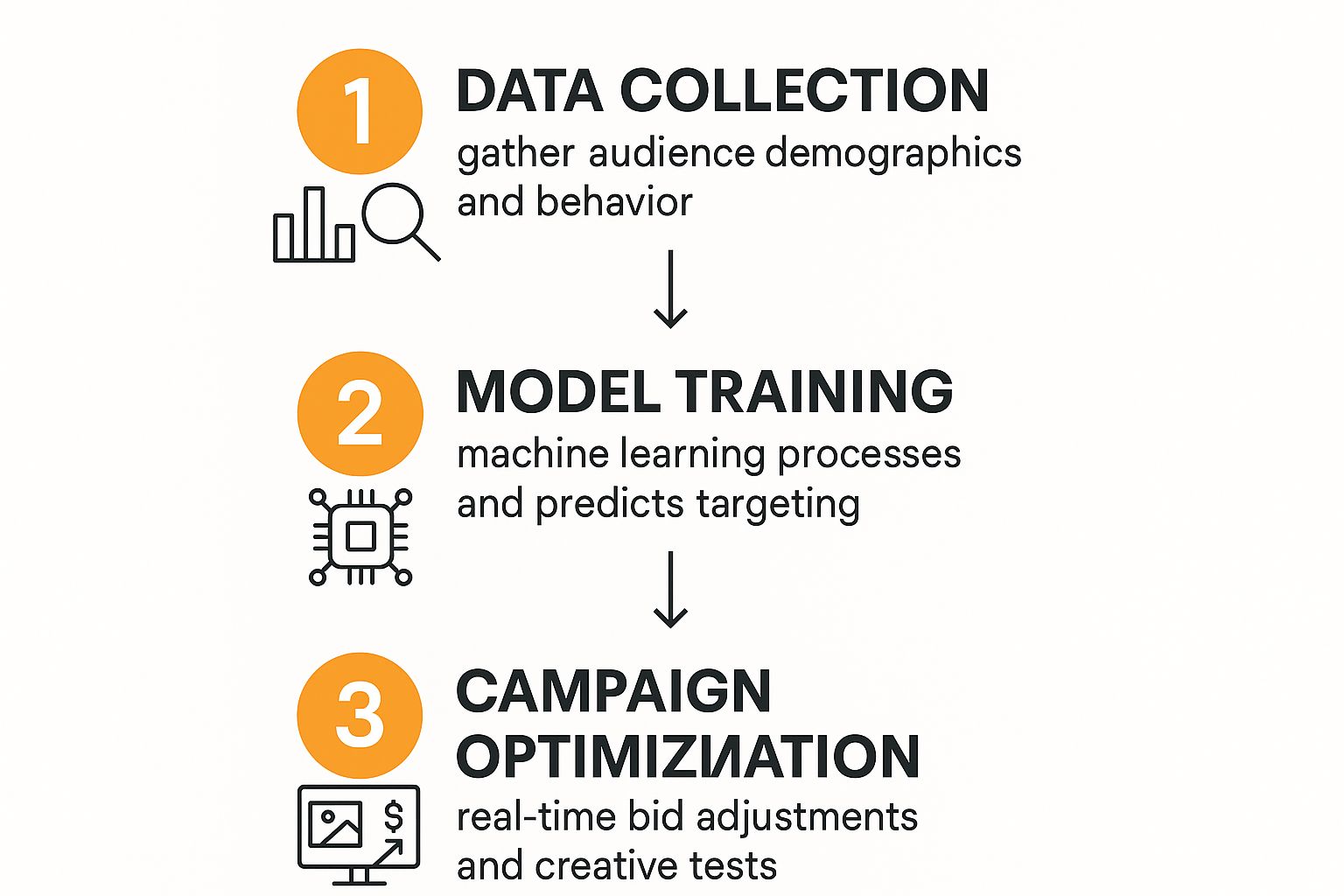
This visualization shows the cyclical nature of AI-powered advertising. Data collection feeds into model training, which then optimizes campaigns and generates more data. This continuous feedback loop leads to ongoing improvement and increased efficiency.
Choosing the Right AI Advertising Partner
Selecting the right vendor is a critical step. Look beyond flashy demos and focus on vendors who understand your specific needs and offer robust support. Consider factors such as platform integration, data security, and reporting capabilities.
A good vendor will provide ongoing training and guidance to help your team effectively use their tools. They should also be transparent about how their AI algorithms work and how they protect user data. This helps build trust and ensures a successful partnership.
Empowering Your Team Through Training and Development
Introducing AI can create anxiety among team members. Address these concerns by providing comprehensive training and emphasizing how AI can enhance, not replace, their roles.
Focus on developing skills that complement AI capabilities, such as strategic thinking, creative problem-solving, and communication. This empowers your team to work alongside AI, using its insights to make more informed decisions.
Managing Expectations and Measuring Success
Set realistic expectations for AI implementation. It’s not a magic bullet; it takes time for AI algorithms to learn and optimize campaigns. Define clear success metrics and track progress regularly.
These metrics could include improved conversion rates, increased ROI, or reduced cost per acquisition. By monitoring these metrics, you can demonstrate the value of AI to stakeholders and ensure your AI strategy stays on track.
Adapting and Evolving With AI
The world of AI is constantly changing. Stay informed about new developments and be willing to adapt your strategy as needed. This could involve experimenting with new AI tools or adjusting your team’s workflows.
By embracing a culture of continuous learning and improvement, you can ensure your AI-powered advertising strategy remains effective and delivers long-term success. This flexible approach allows you to stay ahead of the curve and maximize the benefits of AI. You might be interested in: How to master AI in advertising.
The following table provides a structured approach to implementing AI-powered advertising, outlining key stages, activities, and expected outcomes.
AI Advertising Implementation Roadmap
| Implementation Phase | Key Activities | Required Resources | Expected Outcomes | Timeline |
|---|---|---|---|---|
| Assessment | Audit existing skills, resources, and data infrastructure. | Team members, data analysis tools | Clear understanding of current capabilities and areas for improvement. | 1-2 weeks |
| Data Foundation | Implement data collection and management systems. | Data engineers, analytics platform (Google Analytics) | Robust data pipeline for AI tools. | 2-4 weeks |
| Tool Selection | Evaluate and select AI advertising tools and vendors. | Vendor research, budget allocation | Chosen tools aligned with business needs and team capabilities. | 2-4 weeks |
| Team Training | Provide comprehensive training on AI tools and related skills. | Training materials, vendor support | Team proficiency in using AI tools and interpreting data insights. | 4-6 weeks |
| Implementation & Measurement | Launch AI-powered campaigns and track key performance indicators. | AI advertising platform, reporting tools | Improved campaign performance, data-driven optimization. | Ongoing |
| Refinement & Adaptation | Continuously monitor, analyze, and adapt strategy based on results and new AI developments. | Performance data, industry research | Long-term success and maximized ROI from AI advertising. | Ongoing |
This roadmap helps break down the implementation process into manageable phases, allowing for a more controlled and successful integration of AI into your advertising efforts.
Future-Proofing Your AI Advertising Strategy
AI capabilities are constantly changing. This raises an important question: how can you create an advertising strategy that remains effective over time? By analyzing emerging trends and using practical evaluation methods, we can prepare for the future of AI in advertising. This means understanding which new applications offer real value and which are simply overhyped.
Navigating the Evolving AI Landscape
Marketing leaders and technology experts are always exploring new AI applications. Some, like predictive analytics and real-time bidding optimization, hold significant promise. Others might not live up to the hype. It’s crucial to separate genuine progress from temporary fads. A practical evaluation framework is essential for assessing new AI capabilities.
This framework should consider factors like data requirements, how complex it is to implement, and the potential return on investment. By thoroughly evaluating new technologies, you can avoid wasting resources on unproven solutions and concentrate on those most likely to deliver results.
Building Adaptable Strategies for Long-Term Success
Successful companies aren’t just adopting individual AI tools; they’re developing adaptable strategies. These strategies integrate new technologies while maintaining consistent brand experiences. Think of your AI advertising strategy as a living document, constantly adapting to reflect the latest developments.
This means staying informed about emerging trends and being ready to adjust your approach as needed. This flexibility is essential for staying competitive in the ever-changing world of AI-driven advertising.
Ethical Considerations in AI-Powered Advertising
As AI plays a bigger role in advertising, ethical considerations become increasingly vital. Transparency is paramount. Consumers deserve to know how AI is used to target them with ads. Building trust, not damaging it, is crucial.
Openly communicating how you use AI can strengthen customer relationships. Hiding these practices, on the other hand, can hurt your brand’s reputation. Transparency builds confidence and cultivates a positive brand image.
The Impact of Regulation on AI Advertising
The regulatory environment around AI is constantly evolving. New laws and guidelines are emerging that address data privacy and algorithmic bias. Staying up-to-date on these developments is essential.
These regulations can have a major impact on your AI advertising strategy. Ignoring them could lead to legal problems and damage your reputation. By understanding and following regulations, you can ensure your campaigns are both ethical and effective. Learn more in our article about unlocking ad precision with programmatic.
Ad360: Your Partner in Future-Proofing Your Advertising
Ad360 provides a comprehensive platform for AI-powered advertising, helping businesses navigate the complexities of this dynamic landscape. With Ad360, you can centralize your media buying, optimize campaigns in real time, and use advanced AI features to maximize your ROAS.
Discover how Ad360 can help you build a future-proof AI advertising strategy.
Ad360: Precision in Ad Targeting

Ad360: The Game-Changer in Programmatic Advertising
In the dynamic landscape of digital marketing, Ad360 is emerging as a revolutionary force in media buying. This platform isn’t just another tool in the advertising arsenal; it’s reshaping how ads reach audiences effectively and efficiently. Let’s explore what makes Ad360 a standout in programmatic advertising.
Broad Ad Inventory Access
Ad360 boasts a remarkable ability to access billions of impressions daily across over 160 million websites and apps globally. This wide reach ensures your brand can achieve significant visibility and engagement with a diverse audience.
Access to Google Authorized Buyers and OpenRTB
Ad360 leverages the strengths of both Google Authorized Buyers AdExchange (Google AdX) and is implementing OpenRTB protocol to access any programmatic inventory. Google AdX offers premium, brand-safe environments for your ads, ensuring they are placed on credible and relevant sites. Simultaneously, OpenRTB enhances the ad buying process with efficient, real-time bidding, allowing for optimal ad placement and audience targeting.
Advanced Targeting Options
Ad360’s suite of targeting options enables advertisers to craft highly customized campaigns:
- Retargeting: By tracking users who have previously visited your website or interacted with your brand, Ad360 can display your ads to them as they browse other sites. This increases the likelihood of converting previous visitors into customers, as it keeps your brand top of mind.
- Geo-Targeting & Hyperlocal: Customize your ad campaigns based on users’ physical locations, from broad regions to specific local areas. This is especially useful for localized promotions or for businesses with physical stores wanting to attract nearby customers.
- Device Targeting: Tailor your ads based on whether users are on desktops, tablets, or mobile phones. This helps in optimizing the ad format and message to suit the device preference of your target audience, enhancing user engagement.
- Day Parting: Choose the time of day or week when your ads will appear. This is crucial for targeting users when they are most active online or when your product or service is most relevant, like advertising breakfast items in the morning.
- First Party Audience: Utilize your own data, like website visitor behavior or customer databases, to create highly targeted and personalized advertising campaigns. This can significantly improve conversion rates and customer loyalty.
- Site Lists (Whitelists and Blacklists): Gain control over where your ads are displayed by creating lists of preferred websites (whitelists) or sites to avoid (blacklists). This ensures brand safety and relevance to your target audience.
- Viewability Filters: Filter out non-viewable ad placements, focusing your spend on spots where ads are actually seen by users. This improves the overall effectiveness of your ad spend.
- Historical CTR Filters: Use data on past ad performance to choose sites and placements that have historically high engagement rates. This predictive approach can lead to better campaign performance.
- Position Targeting: Select specific ad positions on a webpage, such as above the fold (visible without scrolling) or next to premium content. This strategic placement can significantly increase visibility and engagement.
- Languages: Target users based on their language preferences, ensuring that your ads are always in a language that your audience understands. This is particularly beneficial for international campaigns.
- Video Placements: Choose the right environment for your video ads, whether it’s within streaming content (in-stream) or in traditional web placements (out-stream). This maximizes the impact and engagement of your video content.
These targeting options collectively enhance the reach, relevance, and effectiveness of your advertising efforts.
Why Choose Ad360?
Ad360 stands out due to its:
- Expansive Reach: With access to an unparalleled number of websites and apps, Ad360 ensures your brand’s presence is felt across the digital landscape. This vast reach is crucial for building brand awareness and capturing a diverse audience.
- Quality Placements: By partnering with elite ad exchanges like Google AdX and utilizing OpenRTB, Ad360 guarantees that your ads are not just seen but seen in the right places. This premium placement is key to maintaining brand integrity and maximizing ad impact.
- Efficient Spending: The real-time bidding capability of OpenRTB, combined with Ad360’s strategic approach, ensures that your budget is spent on the most effective ad placements. This efficiency in spending leads to a higher return on investment.
- Flexible Targeting: Ad360’s wide array of targeting options allows for highly tailored campaigns that speak directly to your audience’s needs and preferences. This level of customization is critical for engaging and converting your target audience.
Conclusion: A New Era in Digital Advertising
Ad360 is more than just a digital advertising platform; it’s your partner in navigating the complex world of online advertising. Its extensive reach, strategic partnerships, and advanced targeting capabilities make it a formidable player in the programmatic advertising space. Ready to transform your digital advertising strategy? Explore Ad360 and lead your brand into a new era of digital dominance.
How to use keyword targeting effectively
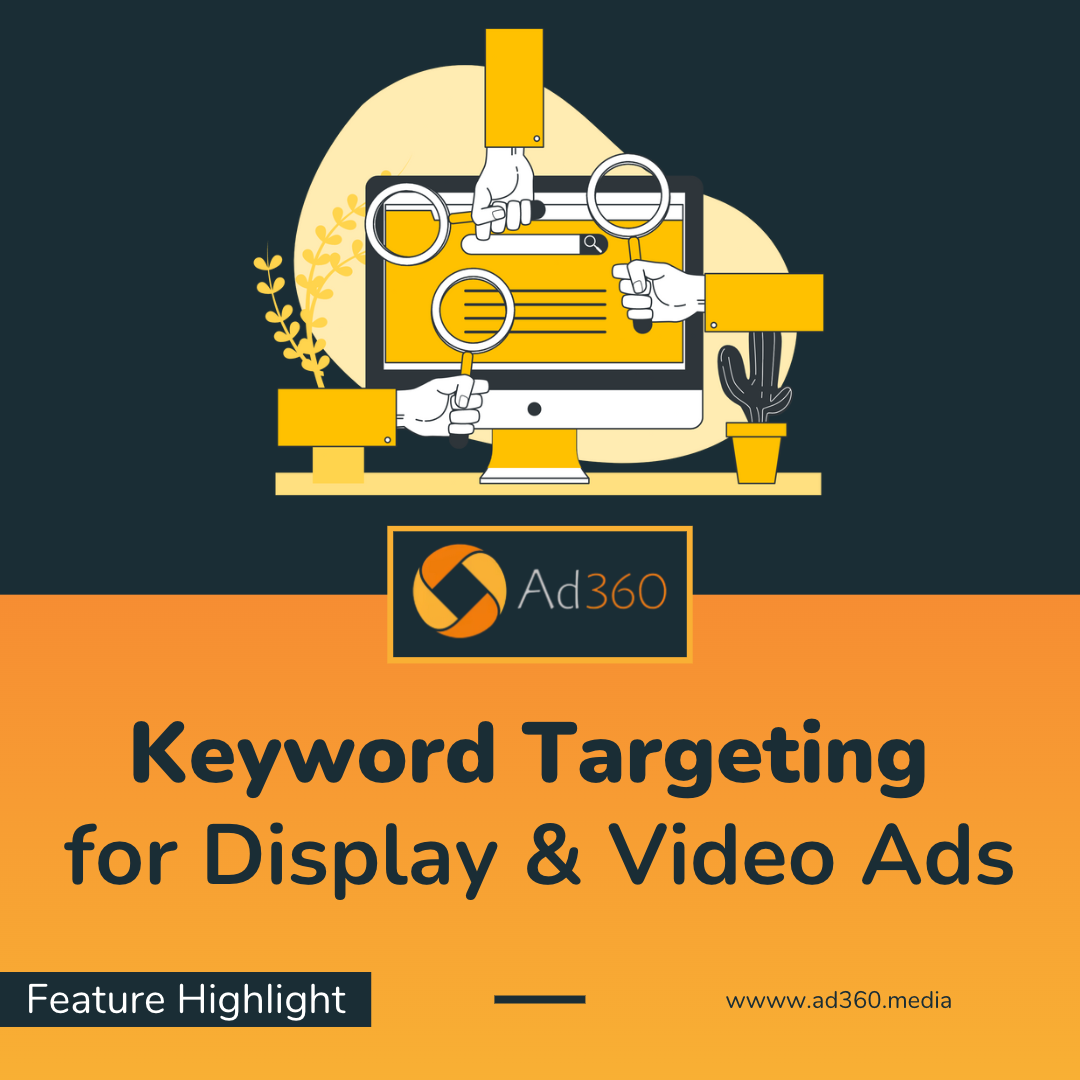
Digital advertising continues to become increasingly competitive.
So reaching the right audience with the right message at the right time has become more important than ever.
Therefore, let us tell about how to use keyword targeting effectively
One way advertisers can achieve this is through keyword targeting, a powerful feature offered by Ad360.
We enable our clients’ ads to be displayed to a highly engaged audience actively searching for products or services like theirs.
What is keyword targeting?
Keyword targeting is a digital advertising strategy that involves selecting specific keywords relevant to a product or service and displaying ads to users who are searching for or engaging with content related to those keywords.
The most common keyword targeting features are, for instance:
E-commerce brands
- “running shoes”
- “smartphone accessories”
Travel company
- “beach vacations”
- “flight deals”
Financial services company
- “investment opportunities”
- “retirement planning”
This strategy can work and is the most widely used one, but we have gone further to be much more specific, therefore increasing the efficiency of the ads.
How we use keyword targeting
Ad360 takes this strategy one step further by also placing ads on websites where specific words or sentences are written, ensuring that our clients’ messages are displayed in the most relevant context possible.
So instead of keyword targeting only related to Search Ads, we use keywords that will actually be on the websites, blogs, or pages that our customers’ audience are visiting.
Below are just a few examples of how Ad360 uses keyword targeting across various industries to reach a highly relevant audience and achieve advertising goals.
Hotel chains expanding to new locations
- “Opening a new hotel branch checklist”
- “Franchise hotel expansion best practices”
- “Opening a new hotel location marketing plan”
Fitness brands selling a Keto diet program
- “should I work out during a keto diet”
- “how to succeed my keto diet”
Software companies selling accounting programs
- “saving time preparing my VAT”
- “automating my bookeeping”
- “avoid spending too much time doing my accounting”
The possibilities are endless, and Ad360’s keyword targeting feature enables advertisers to display their ads to the most relevant audience, increasing their chances of achieving their advertising goals.
We go beyond simple keyword targeting
At Ad360, we understand the importance of reaching your target audience with precision and efficiency.
That’s why we offer a wide range of features that go beyond keyword targeting to help advertisers achieve their advertising goals.
Our platform also offers hyperlocal targeting, cross-channel and multichannel advertising, retargeting, and many more features that help advertisers reach their target audience in the most effective way possible.
Ad360 is a leading digital advertising platform that offers advertisers advanced targeting capabilities, real-time reporting, and a simple, user-friendly interface.
Our platform is designed to help advertisers achieve their advertising goals, whether they’re looking to increase brand awareness, generate leads, or drive conversions.
To sum up, Ad360’s keyword targeting feature is a powerful tool for advertisers looking to reach a highly engaged audience actively searching for products or services like theirs.
By displaying ads in the most relevant context possible, advertisers can maximize their ROI and minimize wasted ad spend.
To learn more about Ad360’s keyword targeting feature and how we can help your business grow, please don’t hesitate to contact us here.
Client focus: Lord of CBD

We are excited to announce that Lord of CBD, one of our valued clients, is opening its third shop today, in the Marais area of Paris.
So if you’re in Paris, go visit them at 88 rue du temple, 75003!
Lord of CBD is a reputable CBD retailer who specializes in premium CBD products, including oils, capsules, and skincare items.
Their products are organic, non-GMO, and third-party tested to ensure quality and purity. They are committed to promoting the benefits of CBD and helping people achieve a healthier, more balanced lifestyle.
We are thrilled to have started working with Lord of CBD to help them expand their reach and grow their business.
Ad360 AI-powered services
Our AI-powered advertising services allow Lord of CBD to promote their products to a broader audience. To make sure that those who are looking for high-quality CBD products can easily find them. Our programmatic advertising capabilities enable targeted ads to reach the right audience at the right time, delivering optimal results.
At Ad360, we are proud to offer multichannel advertising solutions to our clients. We strive to help them maximize their impact and connect with potential customers across various platforms, including websites, mobile apps, connected TVs, and more.
Moreover, our services include real-time optimization, as well as reporting capabilities. Therefore, our clients can make data-driven decisions and improve the performance of their campaigns continuously.
We also work with other CBD businesses, such as Pawell. You can read our case study here, explaining how we’ve helped them promote their products all over the web.
We would like to congratulate Lord of CBD on their new shop opening and moreover thank them for trusting Ad360. We look forward to working with them and helping them achieve their business goals.
To learn more about Ad360’s advertising services and how we can help your business grow, please don’t hesitate to contact us here.
Celebrating our newest customers!
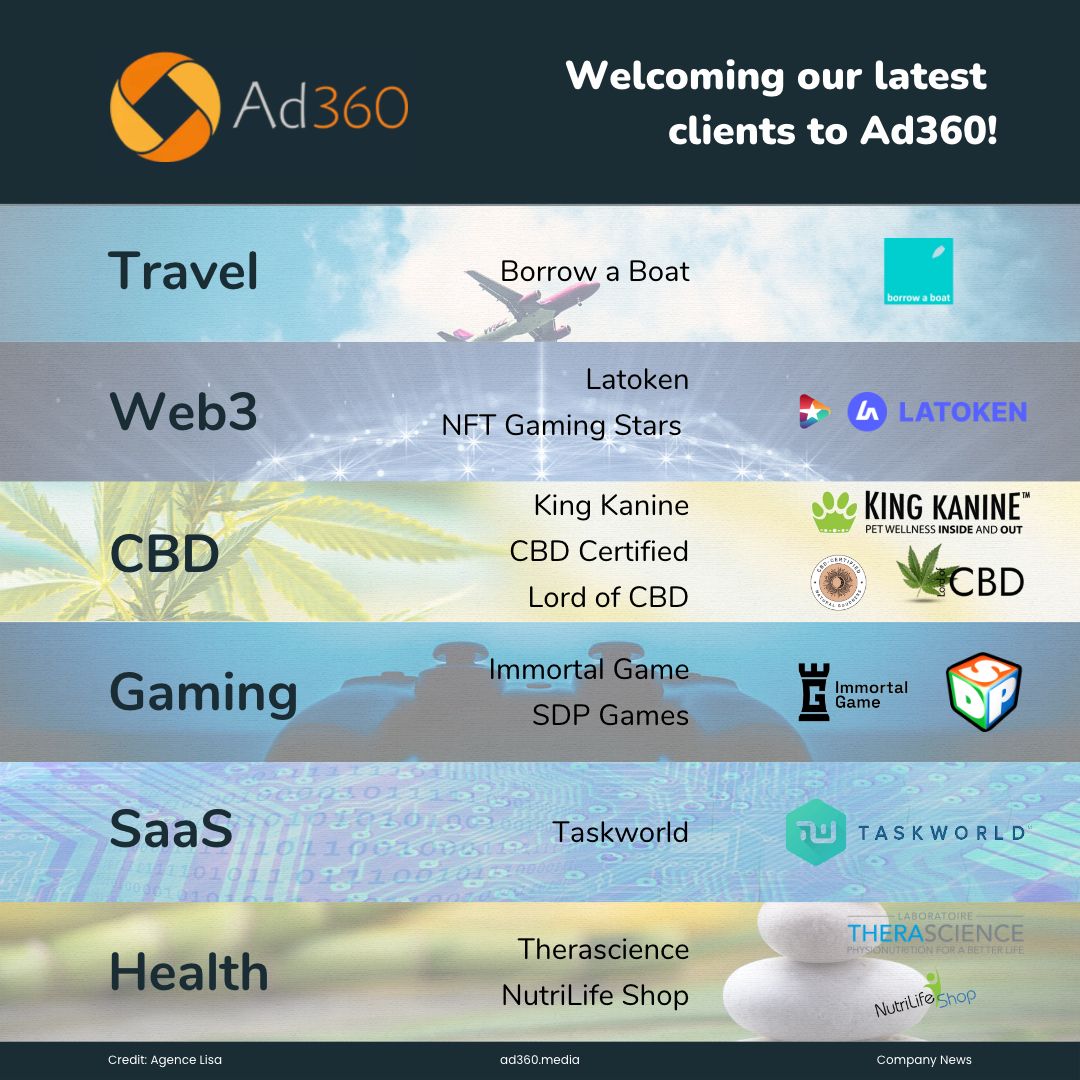
Ad360 is thrilled to announce the recent onboarding of several new clients to our platform. We are delighted to welcome Borrow a Boat, Lord of CBD, King Canine, CBD Certified, SDP Games, Latoken, NFT Gaming Stars, Taskworld, Therascience, Nutrilife Shop, and Immortal Game to the Ad360 family.
At Ad360, we offer AI-powered advertising services that help our clients promote their products and services across multiple channels. Our programmatic advertising solutions enable clients to optimise their ad campaigns in real-time, ensuring that their ads are placed in the right places and seen by the right people.
Borrow a Boat, a leading travel platform, has chosen to use our advertising solutions, showcasing their effectiveness for the travel industry.
For CBD companies, we are proud to work with Lord of CBD, King Canine, and CBD Certified to help them advertise their high-quality, certified products freely all over the web, without restrictions imposed by other ad platforms. For more information, here is a CBD advertising case study detailing some of our work with Pawell.
In the mobile gaming sector, SDP Games has become our client, utilizing our services for their advertising needs. Plus, Immortal Game, a web3 gaming app, has joined our client roster, further demonstrating our expertise in the gaming industry.
Additionally, our work with crypto exchange Latoken, and NFT Gaming Stars project, demonstrates our ability to cater to varied projects in the cryptocurrency industry.
We have also onboarded Nutrilife Shop, a health and wellness company.
Finally, Taskworld, a project management SaaS platform, chose Ad360 to handle all their advertising activities, showing Ad360 can help B2B companies as well.
At Ad360, we specialize in multi-channel and programmatic advertising, which enables our clients to reach their target audience effectively. We leverage advanced AI technology to analyze user behavior and preferences to identify potential new customers who are most likely to engage with our clients’ products or services. Our programmatic advertising solutions allow us to optimize campaigns in real time, ensuring that ads are placed in the right places to drive maximum engagement and conversions, and reduce costs.
In conclusion, we are proud to welcome our new clients to Ad360 and to help them achieve their advertising goals. Our AI-powered advertising solutions are highly effective for promoting products and services across multiple channels, and we believe that other businesses can achieve the same results by joining Ad360.
Contact us today to learn more about our services and how we can help your business grow.